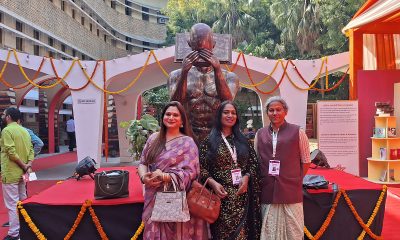India
New Indian immigration law excludes LGBTQ people
Government to offer fast-track citizenship to nationals from neighboring countries

The Indian government on March 11 implemented a law that allows undocumented people who entered the country from Pakistan, Bangladesh, Afghanistan and other neighboring countries before Dec. 31, 2014, to receive fast-track citizenship.
Parliament in 2019 passed the Citizenship Amendment Act, which provides citizenship to undocumented people who are minorities — mainly because they are Hindu, Jain, Sikhs, Buddhist, Parsi and Christian — who face persecution in their countries of origin. The rule that took effect this month does not include LGBTQ people.
LGBTQ Pakistanis face discrimination based on gender identity, violence, homicide, threats and hate speech, discrimination in accessing employment and access to housing. Lesbians, in particular, face challenges that include sexual harassment, violence and a greater chance of losing housing and jobs if sexual orientation is revealed.
According to the Human Rights Watch report in 2022, Afghanistan’s gender minorities have faced grave threats to their safety and lives under the Taliban regime. Even before the Taliban took over the country, former President Ashraf Ghani passed a law that criminalized consensual same-sex sexual relationships.
According to the Taliban’s statement given to the Built, a German tabloid, before the fall of Kabul, the country’s capital, in 2021, gay people would be punished in two ways, either by stoning or by standing behind a wall that will fall on them.
A 2016 Human Rights Watch from 2016 notes the killings of several LGBTQ activists and illegal arrests by police in Bangladesh.
Bangladesh’s National Human Rights Commission in 2013 asked the government to protect the LGBTQ community from discrimination. The commission acknowledged police physically and sexually assault LGBTQ people, and make arbitrary arrests based on an individual’s appearance.
Although India’s CAA does not fast-track citizenship for new arrivals but sticks to the cut-off date of December 2014; there are no records of any LGBTQ Muslims coming from Pakistan, Afghanistan or Bangladesh to India.
The Indian Home Affairs Ministry says the applicant must provide six types of documents and specify the “date of entry” in India.
“These rules will now enable minorities persecuted on religious grounds in Pakistan, Bangladesh and Afghanistan to acquire citizenship in our nation,” Union Home Minister Amit Shah said in an X post on March 11. “With this notification PM (Prime Minister) Shri Narendra Modi has delivered on another commitment and realized the promise of the makers of our constitution to the Hindus, Sikhs, Buddhists, Jains, Parsis and Christians living in those countries.”
More than 1,000 members of the LGBTQ community protested against the law in New Delhi, India’s capital, after Parliament passed it in 2019. Tejasvi Surya, an MP from Bengaluru and a member of the ruling party, said those who are protesting against the CAA, especially LGBTQ members want Pakistani Muslims to come into India.
“Let me assure all of you, you’re seriously misplaced. There is no iota of idea or freedom or recognition of LGBTQ rights in Pakistan,” said Surya. “You are proudly going about your LGBTQ rights and living a dignified existence here and fighting for a more dignified life in India because we are not Pakistan. So, if you let all the Muslims of Pakistan to come into India, then there will be no questions of LGBTQ rights in India.”
The applicant can apply for citizenship in India through an online portal with listed documents that include birth certificates, tenancy records, identity papers and any license, school, or educational certificate issued by a government authority in Afghanistan, Pakistan and Bangladesh. The applicant needs to produce an eligibility certificate issued by a reputable community institution that confirms they belong to the Hindu, Sikh, Buddhist, Jain, Parsi, or Christian community and remains a member of it.
Rani Patel, an activist, and founder of Aarohan, a nonprofit organization that works with transgender Indians, said the LGBTQ community is always neglected.
“Every country has a set of rules and regulations,” said Patel. “We cannot encroach on other’s area. We can take care of our LGBTQ community. We cannot say that we can take your LGBTQ people. We have a huge population, and this is the government’s call.”
Guru Prasad Mohanty, an LGBTQ rights activist in Uttarakhand, told the Washington Blade that the Indian government has always excluded the LGBTQ community.
“The LGBTQ community in India has been left out in every sector and in every form, so I am not surprised that they left the community,” said Mohanty. “I would have been happy, not only me but all the members of the community, if LGBTQ community has been included in this.”
Ankush Kumar is a reporter who has covered many stories for Washington and Los Angeles Blades from Iran, India and Singapore. He recently reported for the Daily Beast. He can be reached at mohitk@opiniondaily.news. He is on Twitter at @mohitkopinion.
India
LGBTQ poets included in India’s premier literary festival
Sahitya Akademi seen as mirror of government’s cultural agenda

India’s premier literary institution on March 7 announced it would allow LGBTQ poets to participate in its marquee Festival of Letters in New Delhi.
The Sahitya Akademi, often seen as a mirror of the government’s cultural agenda, for the first time allowed these poets into a high-profile poetry reading at the Rabindra Bhavan. They shared the stage with more than 700 writers across 50 languages.
Culture and Tourism Minister Gajendra Singh Shekhawat kicked off the Festival of Letters with Mahesh Dattani, the acclaimed English-language playwright famed for his provocative works, as the main guest. Dubbed Asia’s grandest literary gathering, the Sahitya Akademi took place over six days under the “Indian Literary Traditions” theme.
The 2025 Festival of Letters showcased a sweeping range of voices — young writers, women writers, Dalit authors from marginalized castes, Northeast Indian scribes, tribal poets, and LGBTQ poets — cementing its reputation as a literary kaleidoscope.
Kalki Subramaniam, a leading transgender rights activist and author, on March 9 chaired a literary session titled “Discussion on Literary Works of LGBTQ Writers in the 21st Century,” which spotlighted contemporary queer voices.
“It was enriching to listen to the profound thoughts of LGBT writers from various parts of the country in their speeches,” said Subramaniam. “The session was particularly memorable with the participation of A. Revathi Amma from Tamil Nadu, Reshma Prasad from Bihar, Sanjana Simon from New Delhi, and Devika Devendra Manglamukhi and Shivin from Uttar Pradesh and Aksaya K Rath from Orissa.”
Subramaniam discussed how global politics shape gender rights and the persistent erasure of trans identity, urging a unified push for solidarity within the LGBTQ community. She stressed the vital need to elevate queer works and writers, casting their voices as essential to the literary vanguard.
“It was a pleasure to meet great writers from around the country in the festival as well as meet my writer activist friends Sajana Simon and Revathi Amma after a long time,” said Subramaniam.

The government on March 12, 1954, formally established the Sahitya Akademi. A government resolution outlined its mission as a national entity tasked with advancing Indian literature and upholding rigorous literary standards; a mandate it has pursued for seven decades.
The Sahitya Akademi in 2018 broke ground in Kolkata, hosting the country’s first exclusive gathering of trans writers, a landmark nod to queer voices in Indian literature.
Hoshang Dinshaw Merchant, India’s pioneering openly gay poet and a leading voice in the nation’s gay liberation movement, on March 9 recited a poem at the Festival of Letters, his verses carrying the weight of his decades-long quest for queer recognition. He later thanked the session’s chair for welcoming the community, a gesture that underscored the event’s third day embrace of diverse voices.
The Sahitya Akademi in 2024 honored K. Vaishali with the Yuva Puraskar for her memoir “Homeless: Growing Up Lesbian and Dyslexic in India,” a raw account of navigating queerness and neurodivergence. Vaishali in a post-win interview reflected on India’s deep-seated conservatism around sexuality, noting she wrote from a place of relative safety — an upper-caste privilege that shielded her as she bared her truth. The award, she said, was the Akademi’s indelible seal on her lived experience, a validation no one could challenge.
The Sahitya Akademi’s inclusion of LGBTQ writers in its main program this year jars with the Bharatiya Janata Party-led government’s conservative stance, which, in 2023, opposed same-sex marriage in the Supreme Court, arguing it erodes Indian family values. Yet, under Shekhawat, the Sahitya Akademi’s spotlight on queer voices at the Rabindra Bhavan suggests it could be a tentative crack in a regime typically rooted in tradition.
The Festival of Letters hosted a translators’ meeting on March 10, spotlighting P. Vimala’s 2024 award-winning Tamil translation of Nalini Jameela’s “Autobiography of a Sex Worker,” a work steeped in marginalized voices that include queer perspectives.
This platform gained significant support from the BJP-led government, with Shekhawat securing a 15 percent budget increase to ₹47 crore ($5.63 million) in 2024. In Tamil Nadu state, however, Dravida Munnetra Kazhagam’s Chief Minister Muthuvel Karunanidhi Stalin, has long opposed such cross-linguistic efforts, fearing dilution of Tamil identity amid decades of anti-Hindi sentiment — a tension the Sahitya Akademi’s inclusive showcase sought to bypass.
‘The Akademi is very inclusive and has a friendly festival ambience,” Subramaniam told the Washington Blade.
India
LGBTQ Indians remain vulnerable to dating app scammers
Gay man in Mumbai lost nearly $11K in 2024

Swiping right has become a pricey trap for many in India, where Grindr and other dating apps serve as stalking grounds for scammers spinning fake profiles, sob stories, and shattered promises. This deception hits the LGBTQ community hardest, with reports indicating hundreds of people are duped each year.
The modus operandi of these scams unfolds when an LGBTQ user connects with a match on Grindr or Tinder, someone claiming to be from the U.S. or Europe, and the texts spark a flawless romance, until a frantic call shatters the illusion. They’ve flown to India to meet them, they say, but customs officials at the airport have detained them for carrying wads of foreign cash. A desperate plea follows: Send money to settle fines, with a hollow vow to repay once released—a vow that vanishes the moment the payment lands.
Although dating apps have tightened policies to shield users—Match Group, Tinder’s parent company, rolled out a campaign across Tinder, Hinge, Match, Plenty of Fish, and Meetic with in-app tips to spot scams—fraud persists. Delhi Police on Jan. 11 busted a gang that targeted gay men on Tinder, luring them with fake profiles promising shared desires, then holding them hostage to extort cash. A minor was among the five people who authorities arrested.
Though India decriminalized homosexuality in 2018, lingering social stigma still marks LGBTQ people as prime targets for dating app scammers.
Noida police in Uttar Pradesh state in 2020 dismantled a gang that honey-trapped at least 10 professionals on a gay dating app, robbing two of them of $500 and $1,700 respectively. Gurugram police in Haryana, a bustling tech and finance hub, that same year nabbed another gang that preyed on more than 50 users of the same app.
Scammers often dig deep, coaxing out home addresses, job details, and family ties from their targets—sometimes with an accomplice who turns violent, assaulting the victim. Activists, however, note most of them don’t come forward to the police, silenced by India’s staunchly conservative mores that allow catfishers to slip away and target more people unchecked.
A 28-year-old gay man in Mumbai in March 2024 fell prey to a dating app scam, losing nearly $11,000 to a man posing as a Texas-based doctor.
After striking up a friendship online, the scammer promised an expensive watch as a gift—only to call the next day, claiming he’d been detained at Delhi’s airport for carrying a hefty sum of foreign currency. Moments later, a supposed customs officer named Priya demanded $859 in taxes to secure his release. What began as a single payment spiraled into a financial abyss, with the victim funnelling roughly $11,000 in a month, the Indian Express reported.
“These incidents have grabbed headlines recently. Scammers create fake profiles, build trust with their targets, and then hit them with extortion demands, threatening to out them to family or friends, said Ankit Bhuptani, an LGBTQ activist who founded Queer Hindu Alliance. “It’s a cruel twist of the knife, preying on the fear of societal rejection that still lingers despite legal progress.”
“Even though the Supreme Court struck down parts of Section 377 in 2018, decriminalizing homosexuality, the reality on the ground is that acceptance isn’t universal,” added Bhuptani. “Families and communities can still be harsh, and these scammers weaponize that vulnerability. The fact that arrests have been made—like those recent busts in Ghaziabad and Noida—shows the police are acting, but the persistence of these scams tells us we have got a long way to go.”
Bhuptani noted that a mix of technological, societal, and legal challenges fuels these scams. He said scammers thrive because dating apps can be a Wild West—fake accounts are easy to set up, and AI tools make them even more convincing.
“I have heard of cases where victims lost lakhs (thousands of US dollars), like that guy in Ghaziabad who was blackmailed for 1.4 lakhs ($1,700) after being filmed in a compromising situation. It’s predatory and shameless,” said Bhuptani. “The emotional toll is just as bad as the financial hit—imagine the terror of being outed in a society where many still see being gay as taboo.”
Bhuptani argued India’s legal framework is primed to tackle dating app scams, pointing to constitutional protections—Article 14’s equality guarantee and Article 15’s anti-discrimination shield the Navtej Johar ruling, which decriminalized homosexuality in 2018, bolstered. He noted that blackmail and extortion already fall under Indian penal code Sections 383 and 384, while the IT Act can pin scammers for online fraud and identity theft.
“The problem isn’t the laws; it’s enforcement and awareness. Police need better training to handle queer-specific cases with sensitivity, and dating apps must step up—think stricter verification, AI-flagging of suspicious profiles, and user education on spotting red flags,” said Bhuptani. “But laws alone won’t fix this. Society’s got to shift. As long as being LGBTQ carries a stigma, scammers will have leverage. We need campaigns—loud, bold ones—pushing acceptance, normalizing queer identities, and making it clear that outing someone is not a weapon that works anymore.”
Pune police, meanwhile, on Feb. 27 filed an First Information Report against a gang that blackmailed a gay man on a dating app, bleeding him of $1,248 over five months.

The government of Tamil Nadu in southern India has proposed a policy that is designed to improve the lives of LGBTQ and intersex people in the state.
The Tamil Nadu State Planning Commission introduced the “Draft Policy for the Welfare of LGBTQIA+ Persons” in July 2023. Key provisions include a 1 percent quota for transgender and intersex people in education and employment. Progress to implement the policy has been hindered because of the government’s fragmented approach of developing separate policies for different groups within the community.
The Madras High Court in January 2024 acknowledged Tamil Nadu’s proposed policy and commended the state’s efforts.
The court highlighted key recommendations, such as establishing a State Commission for Sexual and Gender Minorities and introducing quotas, while stressing the need to combat discrimination and violence. The court this month, however, raised concerns about the government’s separate policies for trans people and the broader LGBTQ community.
Justice N. Anand Venkatesh stressed the need for a single, unified policy to effectively address the challenges the LGBTQ community faces. He directed the Social Welfare and Women Empowerment Department to submit a separate proposal for trans people and a consolidated LGBTQ one by Feb. 17 that would allow stakeholder input and improvements.
The Madras High Court has been actively guiding the Tamil Nadu government towards formulating a unified and comprehensive policy for the LGBTQ community, rather than separate policies for different groups within the community.
Tamil Nadu’s proposal offers several advantages aimed at promoting inclusivity and equality. It would provide healthcare inclusion, recommending the extension of the Chief Minister’s Health Insurance Scheme to cover trans-specific medical procedures, such as gender-affirming surgeries, to ensure essential healthcare is accessible. The proposal calls for nondiscrimination policies in all government departments and public authorities that seek to protect LGBTQ people from bias and violence.
The proposal calls for educational institutions to adopt policies that raise awareness and address issues of violence, abuse, and discrimination against students with diverse gender identities and sexual orientations. It also suggests the creation of bodies like the Tamil Nadu Council for LGBTQ Persons and District Level LGBTQ Welfare and Justice Committees to coordinate efforts across government departments.
“Tamil Nadu is the first state in India to develop a unified policy covering sexual orientation, gender identity and sex characteristics, based on a recent Madras High Court directive,” said L. Ramakrishnan from SAATHII, an organization that works to create an inclusive healthcare system, and a member of the policy drafting committee. “This is important because critical sensitization interventions for inclusive education, healthcare and employment require understanding of sexual, sexuality, and gender diversity,”
“At the same time, recognizing the added vulnerabilities of trans and intersex individuals, provisions such as horizontal reservations and free land allocation are proposed only for transgender and intersex individuals,” added Ramakrishnan.
The proposal, among other things, calls for gender-neutral bathrooms and hostels. It also seeks to protect LGBTQ people from family violence and from corrective rape and so-called conversion therapy that medical providers and faith healers carry out.
The proposed policy would also acknowledge and support relationships outside the traditional marriage framework. It proposes a Deed of Familial Association that would legally recognize queer relationships as the Madras High Court ruled in a case of a lesbian couple who sought protection from harassment. While the deed would offer protection from family and societal harassment, it would not extend legal status or rights associated with marriage or civil unions.
The Indian Supreme Court on Oct. 17, 2023, ruled against marriage rights for same-sex couples.
“We have long been working and sensitizing the government for a policy,” said Kalki Subramaniam, a trans activist and artist who founded the Sahodari Foundation, an organization that supports trans people in India. “It seems to be happening. We, the trans community, demand a separate policy for us because we are the most marginalized and poorest community in the entire LGBTQI spectrum.”
“I insist on two different policies: One for us, trans and intersex persons, and the other for the LGB community. Practically, it is very much possible,” added Subramaniam. “The state government, months ago, held public meetings with the trans community in all districts, and the community’s overall demand is a separate policy. I welcome the commission and insist it should have representatives from trans women, trans men, and intersex communities.”
She told the Washington Blade the proposed policy is something for which the community has been waiting for years, and is happy to see it on the table. Subramaniam noted the quota, in particular, will ensure equal opportunities in jobs and education.
“Tamil Nadu government’s laudable efforts in building equity for the LGBTQIA+ community stands as a magnificent beacon of hope,” said Harish Iyer, an Indian LGBTQ activist. “In times of absolute disregard across the world, this effort puts not just the queer community, but India in the forefront of humanitarian efforts.”
-

 Opinions4 days ago
Opinions4 days agoBoston sanctuary designation must be backed by policy changes
-

 Australia5 days ago
Australia5 days agoLesbian tennis player from Russia defects to Australia
-

 Music & Concerts3 days ago
Music & Concerts3 days agoKylie brings ‘Tension’ tour to D.C.
-

 Commentary5 days ago
Commentary5 days agoHistory of D.C. Pride: 1995-2007, a time of growth and inclusion











